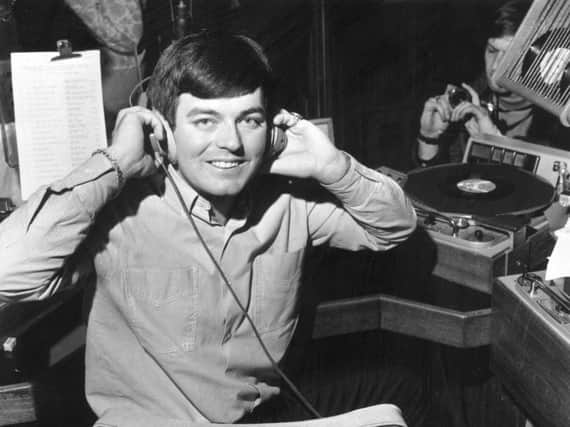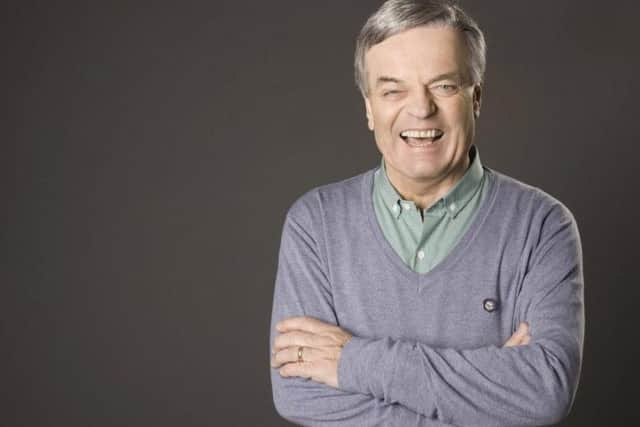Tony Blackburn on his exciting pirate radio days, his love of 60s music and meeting Frank Sinatra


He was working for Radio Caroline, the pirate radio station, at the time. “It was exciting and sometimes a bit dangerous out in the North Sea. On one occasion we got shipwrecked in a gale and had to get rescued by the coastguard,” he says.
This was in the mid-1960s when so-called pirate music stations such as Radio Caroline and Radio London began broadcasting to the UK from offshore ships or disused sea forts. These stations were not deemed illegal because they were broadcasting from international waters (though not for long).
Advertisement
Hide AdAdvertisement
Hide AdBlackburn joined Radio Caroline two months after it started. “I saw an advert in the NME wanting DJs for a pirate ship and I applied and got the job,” he says.


Today he is one of the country’s most recognisable presenters, though initially he wanted to be a singer. “I wanted to get into the record business and I thought being a DJ would be a good way in.” He made 29 singles, including So Much Love, which made the charts, as well as a couple of albums. “I gave it a good go but other DJs wouldn’t play my records and obviously I couldn’t play them.”
So when his singing career failed to take off he concentrated on the day job, playing records instead of making them. He honed his craft working as a DJ for Radio Caroline and Radio London for three years, before joining the BBC in 1967, initially broadcasting on the Light Programme.
Mark Addy on playing detective who caught Jeremy Bamber in White House Farm: “Parts like this don’t come along often”The government had recently outlawed the unregulated offshore pirate radio stations, using the Marine Broadcasting Offences Act and this coincided with the BBC – which lacked a dedicated popular music station – introducing a radical overhaul of its radio output. The future was ‘Radio by numbers’ – with Radio 1 and Radio 2 replacing the Light Programme, Radio 3 succeeding the Third Programme and Radio 4 taking over from the Home Service.
Advertisement
Hide AdAdvertisement
Hide AdRadio 1, the “swinging new radio service” as Radio Times billed it, was launched in an effort to tap into the burgeoning youth culture movement and meet the demand for the kind of rock and pop music played by the pirate radio stations.
Blackburn, along with ex-pirate disc jockeys such as Ed ‘Stewpot’ Stewart, Kenny Everett, John Peel and Johnnie Walker, was among the new breed of radio presenter brought in.
Blackburn was the first DJ on air when Radio 1 was launched in September 1967 with his new programme Daily Disc Delivery with Robin Scott, then Controller of Radio 1, standing over him. The first record played on the fledgling station was The Move’s Flowers in the Rain (the second, for the record, was Massachusetts by the Bee Gees).
He has fond memories of those early days. “Me and Kenny Everett designed the studio and they just let us get on with it. Rather than saying, ‘We are the BBC’ they said, ‘You’ve been doing this for three years and we’ve never done it before, so you show us how to do it’. And it went very well. It did better than people thought it would,” he says. “Radio 1 became the big station. They didn’t really know what to do with Radio 2 and now it’s the other way round.”
Advertisement
Hide AdAdvertisement
Hide AdSpiders from Mars’ drummer Woody Woodmansey talks about David Bowie and what life was like in his band as he returns to HullBlackburn was in the eye of this cultural storm and it’s an era he’s been synonymous with ever since. So much so that he’s in Yorkshire this month with the BBC Radio 2 Sounds Of The 60s Live UK tour, which has been extended due to popular demand.
The show, which he hosts, features songs, stories and memories from the period with live music performed by the Sounds Of The 60s All Star Band & Singers. “I’m absolutely thrilled that the live tour has proved so popular. It’s proof that the music of the Sixties is as loved now as it was back then,” he says.
“So much great music came from that period from soul to all the flower-power stuff. It was a great time to be around and it was a fun time to be around. It’s hard to comprehend that it all happened over that 10-year period, though actually it was from 1964 onwards, because it all really started with The Beatles and Rolling Stones.”
It was a decade that revolutionised music (not to mention art, film and fashion). “I talked to Tony Hatch one time and he said the perfect pop song was two and a half minutes and had a catchy tune. Many of the most memorable pop songs come from the Sixties.
Advertisement
Hide AdAdvertisement
Hide Ad“Not all of them were great. There were some bad ones too. But when you look back, that era produced a lot of memorable music.”
Blackburn is a big fan of soul and the likes of Stevie Wonder, Diana Ross and Dusty Springfield. He’s also met many of the grandees of popular music down the years and one person, in particular, stands out.
“I met Frank Sinatra and he was really impressive. The minute he walked into the room you knew you were in the presence of someone special. We shared the same manager and I met him at a party he was hosting and I remember him saying, ‘Have a good life, Tony.’ It was like being given a command and I said, ‘Thank you, I will.’ He actually rang me up one time when I was doing my breakfast show and I hung up on him because I thought it was someone playing a joke.”
How teenage drag queen inspired Sheffield theatre director to create hit West End showIt’s not the only encounter he’s had with a music legend. “Stevie Wonder turned up out of the blue at a show I was doing just to thank me for playing Motown music because I was the person who introduced Motown to this country. That was quite something.”
Advertisement
Hide AdAdvertisement
Hide AdMusic trends have come and gone over the decades but Blackburn remains one of the few pioneers from the Sixties still plying his trade as a DJ. He believes radio continues to play an important role but says it needs to be allowed to grow naturally instead of trying to constantly chase younger audiences.
“My daughter is 22 and she listens to the radio in the car but apart from that she listens to music through Spotify. I think the people who run radio and TV need to realise that an audience grows into what they put out. I’d like to say to the TV and radio bosses, ‘Don’t panic, we’re doing OK.’”
Now 76, he has lost none of his enthusiasm for the job. “I just get a kick out of it. I started out back in 1964 when I sat down in front of a microphone for the first time and it just felt really natural.
“People say, ‘How can you sit in a room listening to yourself?’ but to me it seemed the most natural thing in the world. The microphone doesn’t answer back and it loves everything you do and I still get the same kick out of it as I did 56 years ago.”
The Sounds Of The 60s Live tour is on at St George’s Hall, Bradford, on January 16 and Sheffield City Hall, on April 25.